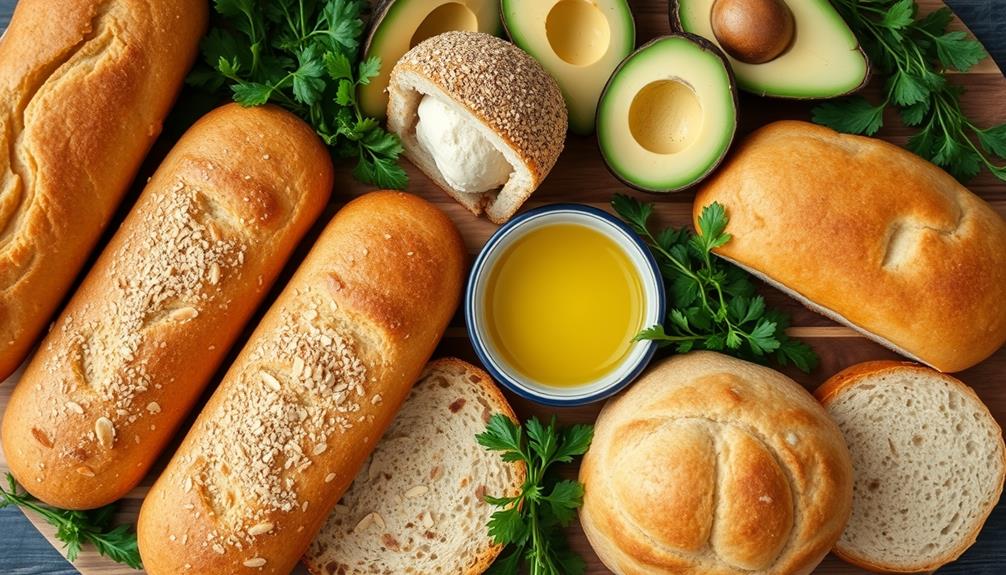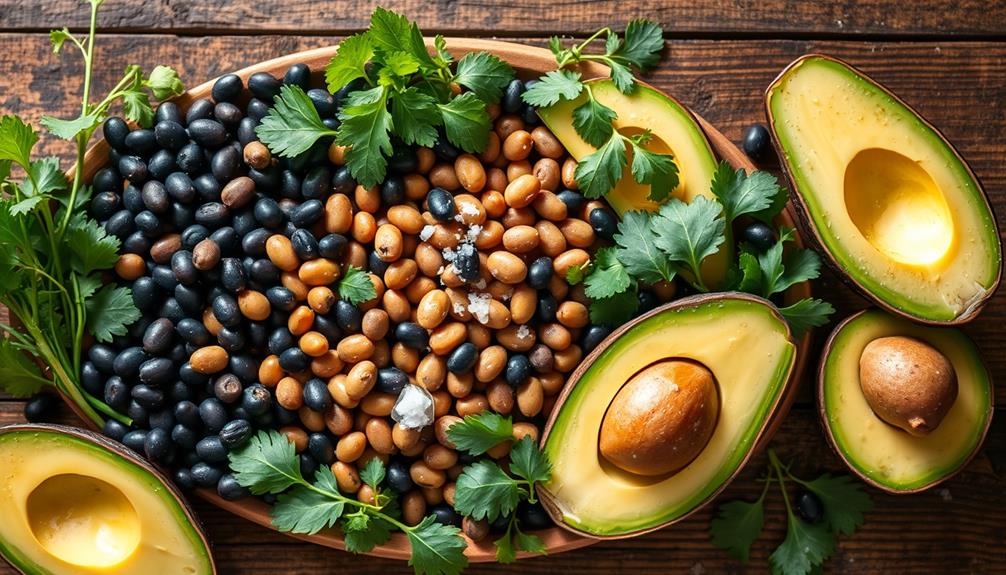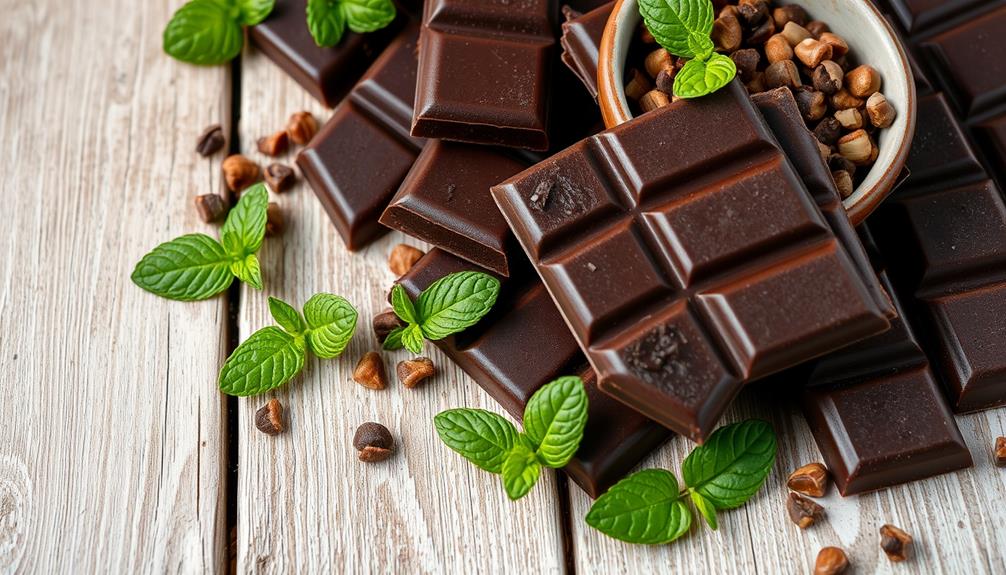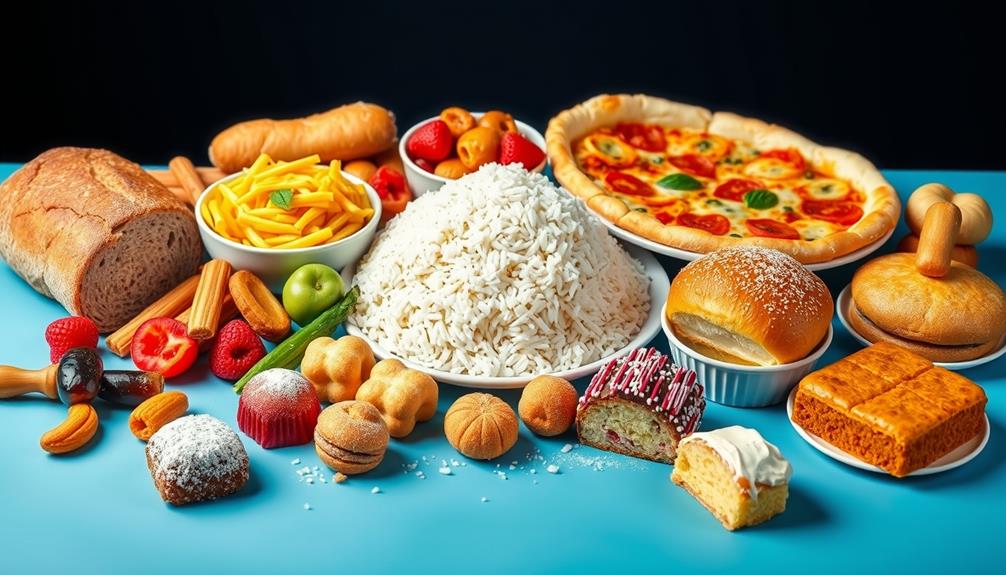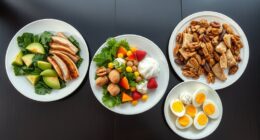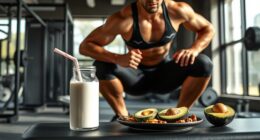When you're on a keto diet, choosing the right bread makes all the difference. Look for options with 5 grams or fewer net carbs per slice, like almond flour-based loaves or cloud bread made from eggs and cream cheese. Brands like Great Low Carb Bread Co. and Carbonaut offer excellent choices, featuring high fiber and protein to keep you satisfied. Be sure to check for quality ingredients, ensuring they're low in sugars and artificial sweeteners. If you're curious about more delicious keto-friendly options, you might find some tasty surprises just ahead!
Key Takeaways
- Look for keto bread options containing 5 grams or fewer net carbs per slice to maintain ketosis effectively.
- Prioritize breads made with almond or coconut flour for lower carb counts and higher fiber content.
- Choose brands like Great Low Carb Bread Co. and Carbonaut for reliable low-carb bread options.
- Ensure the bread has at least 5 grams of protein per serving to support muscle health and satiety.
- Consider alternatives like cloud bread or lettuce wraps for low-carb meal flexibility and variety.
Overview of Keto Bread Options
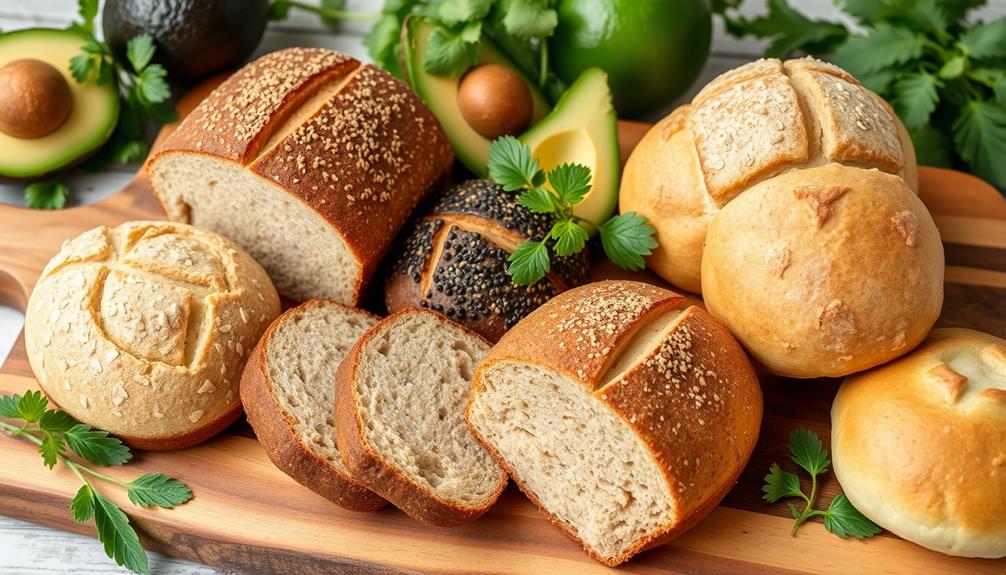
When it comes to choosing keto bread options, you'll find a variety designed to keep your carb intake low while satisfying your cravings. Keto bread typically features 5 grams or fewer net carbs per serving, making it perfect for a low-carb or keto diet.
One popular choice is almond flour-based loaves, which provide a nutty flavor and satisfying texture. You might also enjoy cloud bread—made with eggs and cream cheese—which offers a light, fluffy alternative.
If you're shopping at your local grocery store, look for brands like Great Low Carb Bread Co. and Carbonaut, which offer a range of products including loaves, tortillas, and bagels. These options cater to diverse tastes while keeping carbs in check.
Additionally, you can try homemade bread alternatives, like Scotty's Everyday Keto Bread Zero Carb Mix, which allows you to customize your baking to fit your preferences.
Key Factors for Choosing Keto Bread
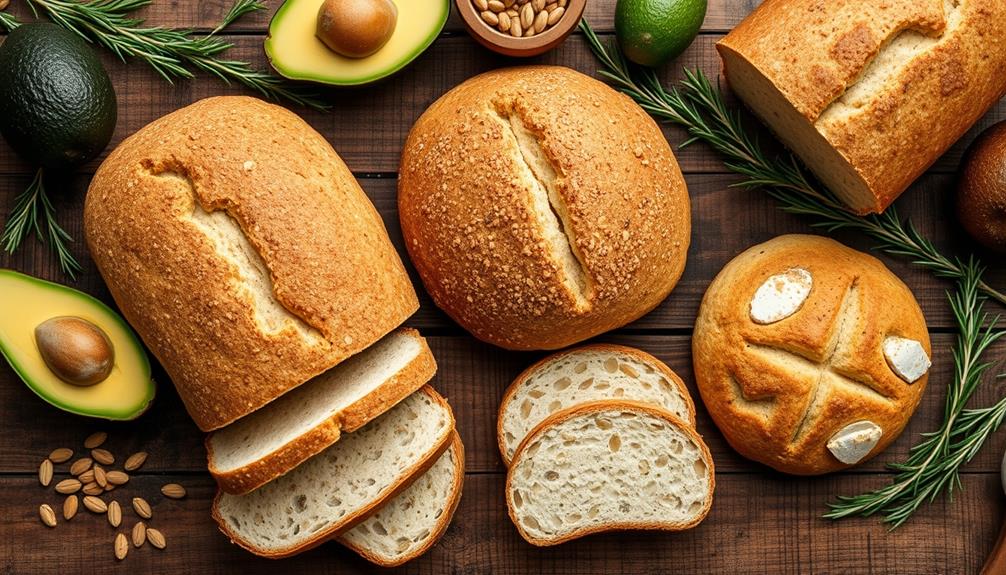
When choosing keto bread, it's vital to analyze the carbohydrate content carefully to keep your body in ketosis.
You'll also want to assess the quality of the ingredients to guarantee you're fueling your body with the right nutrients.
Focusing on these factors will help you find the best options that align with your keto lifestyle.
Carbohydrate Content Analysis
Choosing the right keto bread hinges on understanding its carbohydrate content. To maintain ketosis, you should aim for low-carb bread with 5 grams or fewer net carbs per serving. Many options on the market, like those from Carbonaut and Joseph's Bakery, fit this criterion while incorporating healthful ingredients such as almond flour and coconut flour.
These flours not only lower carb counts but also provide higher nutritional value compared to traditional wheat flour.
Another important aspect is the high fiber content typically found in keto breads, often exceeding 6 grams per slice. This fiber aids in digestion and helps you feel full longer.
When you're checking out different breads, always scrutinize the nutrition label for added sugars. You want to confirm your keto bread is free from sugar and artificial sweeteners to stay aligned with your dietary goals.
Ingredient Quality Assessment
Understanding carbohydrate content is just the starting point; ingredient quality plays a significant role in selecting the best keto bread. When choosing your bread, prioritize options made with low-carb flours, like almond flour or coconut flour. These flours typically have fewer net carbs and higher fiber content, making them ideal low-carb foods for your ketogenic diet.
Next, look for breads that contain healthy fats, such as avocado oil or olive oil. These fats not only enhance flavor but also contribute to satiety, which is vital on a high-fat diet.
It's essential to guarantee the bread is sugar-free and free from artificial sweeteners, as these can spike blood sugar levels and disrupt ketosis.
Moreover, check for high protein content. Opt for breads with at least 5 grams of protein per serving to help maintain muscle mass.
Finally, consider the ingredient list. A short and simple list often means fewer preservatives and additives, indicating higher quality and better nutritional value.
Top Keto Bread Brands
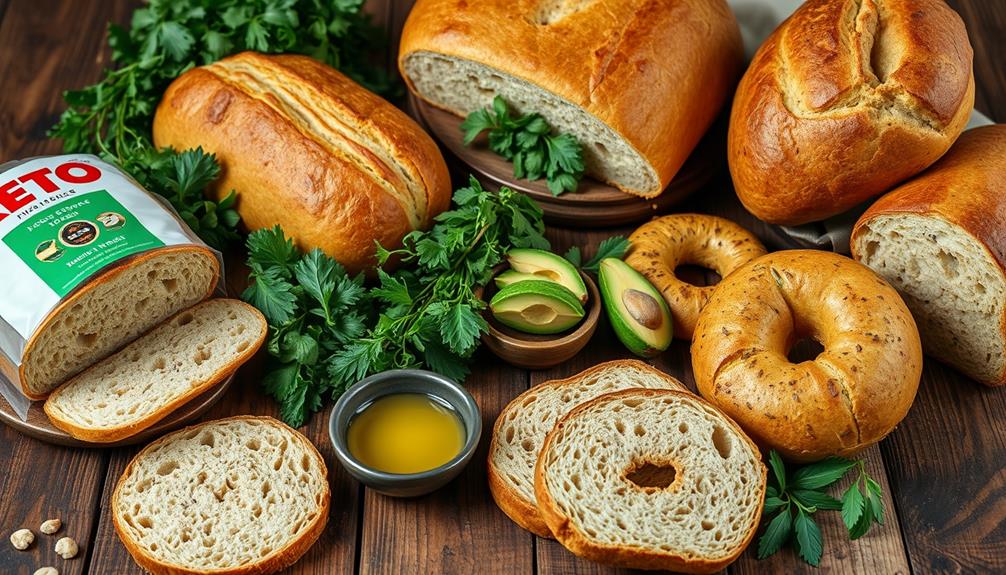
When it comes to choosing the best keto bread, you'll want to compare nutritional profiles to find what suits your needs.
Some popular brands stand out for their low carb counts and quality ingredients, ensuring you stick to your diet without sacrificing flavor.
Let's explore these top keto bread brands and see how they measure up.
Nutritional Profiles Comparison
Keto bread options vary widely in nutritional profiles, making it essential to compare them for the best fit for your diet.
For instance, Great Low Carb Bread Co. Sourdough Bread Loaf contains 8 grams of carbohydrates, 7 grams of fiber, and 7 grams of protein per slice, perfect for hearty sandwiches.
If you're seeking something low in carbs, consider Hero Flour Tortillas, which have 0 grams of net carbs and 16 grams of fiber, maintaining a traditional flavor.
Base Culture Store Keto Bread Seven Nut & Seed also contains 8 grams of carbohydrates per slice but is free from whole grains, offering a nutritious, whole-food option.
On the other hand, Carbonaut Low Carb Seeded Bread provides 8 grams of carbohydrates and 6 grams of fiber, supporting gut health while keeping your carb intake in check.
Lastly, ThinSlim Foods Keto Food Bagels stand out with 0 grams of net carbs and 14 grams of protein per bagel, making them versatile for various toppings.
Popular Brand Highlights
If you're on a keto diet, choosing the right bread can be a game-changer for your meals. You'll want to look for options that are low in carbs yet satisfying. Look for breads made with almond or coconut flour, as these are often lower in carbs compared to traditional wheat bread. Another great option is to make your own keto-friendly bread at home using ingredients like almond flour, eggs, and baking powder. Pair your low-carb bread with some ketofriendly sour cream for a delicious snack or meal that fits your keto lifestyle.
For instance, the Great Low Carb Bread Co. Sourdough Bread Loaf contains 8 grams of carbohydrates per slice, along with 7 grams of fiber and protein, making it perfect for hearty, traditional sandwiches.
Another option is the Hero Flour Tortillas, featuring 0 grams of net carbs, 7 grams of protein, and 16 grams of fiber, allowing you to enjoy wraps without the guilt.
If you're looking for something unique, try Base Culture Store Keto Bread made with seven nuts and seeds, also at 8 grams of carbs per slice, and completely free from wheat and grains.
For a seeded choice, Carbonaut Low Carb Seeded Bread offers the same 8 grams of carbs per slice, promoting gut health with its 6 grams of fiber.
Ingredient Quality Assessment
Choosing the right bread goes beyond just looking at carb counts; it's also about the quality of the ingredients. When you're following a keto diet, prioritizing ingredient quality guarantees you're not only keeping your carb intake low but also nourishing your body with healthy fats and protein.
Here are three key factors to evaluate when reflecting on ingredient quality in keto bread:
- Whole Ingredients: Look for breads made with almond flour, coconut flour, and eggs. These options are nutrient-dense and support better digestion.
- Net Carbs: Some brands, like SOLA Sweet & Buttery Keto-Friendly Bread, offer as little as 2 grams of net carbs per slice. This makes them perfect for strict keto dieters.
- No Artificial Additives: Brands like Base Culture and Carbonaut focus on a clean ingredient profile, avoiding artificial preservatives that can hinder your health goals.
Focusing on these elements will help you choose keto bread that aligns with your dietary needs while supporting overall health.
Low-Carb Bread Alternatives
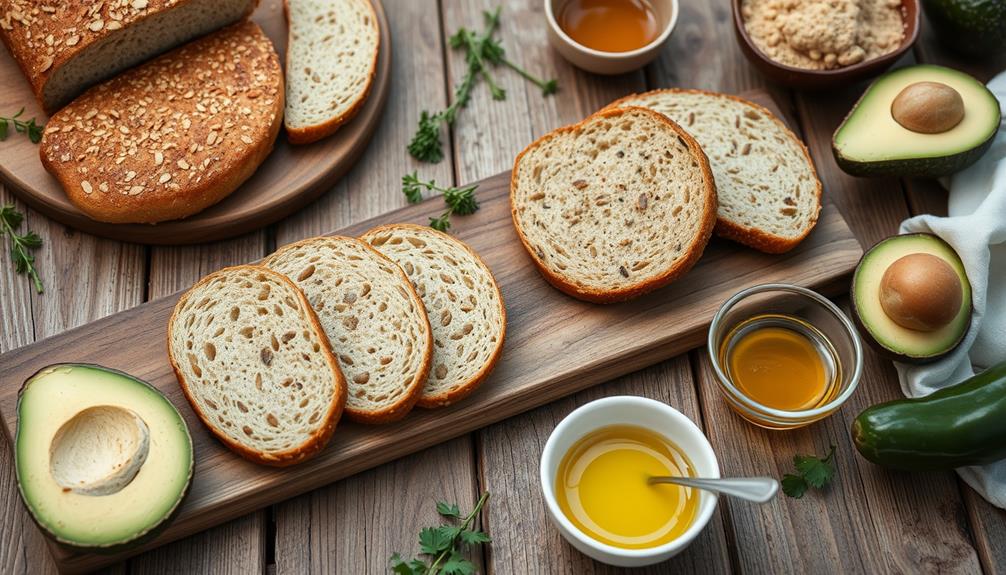
Finding suitable bread alternatives on a keto diet can feel challenging, but there are plenty of delicious options to explore. Low-carb bread alternatives typically contain less than 15 grams of carbohydrates per slice, making them a perfect fit for your meal plans.
One popular choice is cloud bread, which is made from eggs and cream cheese. It's high in protein and extremely low in carbs, allowing you to satisfy your bread cravings without derailing your diet.
While Ezekiel bread isn't strictly keto, it has around 15 grams of carbs per slice and is made from sprouted grains, providing some extra nutrients.
If you're in the mood for pizza, cauliflower pizza crust serves as a versatile low-carb alternative to traditional pizza bases, letting you enjoy a satisfying meal without the excess carbs.
For sandwiches or tacos, consider using lettuce leaves or nori sheets as wraps. These options not only keep your carb intake low but also add essential vitamins and minerals to your diet.
Embrace these low-carb bread alternatives, and you'll find it easier to stick to your keto diet while enjoying your favorite foods!
Nutritional Benefits of Keto Bread

Keto bread offers impressive nutritional benefits that align perfectly with your dietary goals. With its carefully selected ingredients, it's designed to support your ketogenic lifestyle while keeping you satisfied.
Here are three key benefits of keto bread:
- Low Net Carbs: Most keto breads contain less than 5 grams of net carbs per slice. This helps you maintain the strict carbohydrate limits necessary for ketosis.
- High-Fiber Ingredients: Many varieties use almond flour and coconut flour, which are rich in fiber. This not only aids digestive health but also promotes feelings of fullness, making it easier to resist unhealthy snacks.
- Nutrient-Dense: Keto bread typically has a higher protein content, providing essential amino acids for muscle repair and overall health.
Plus, the inclusion of healthy fats, such as those from eggs and nuts, supports your energy levels and helps with weight control.
Tips for Incorporating Keto Bread
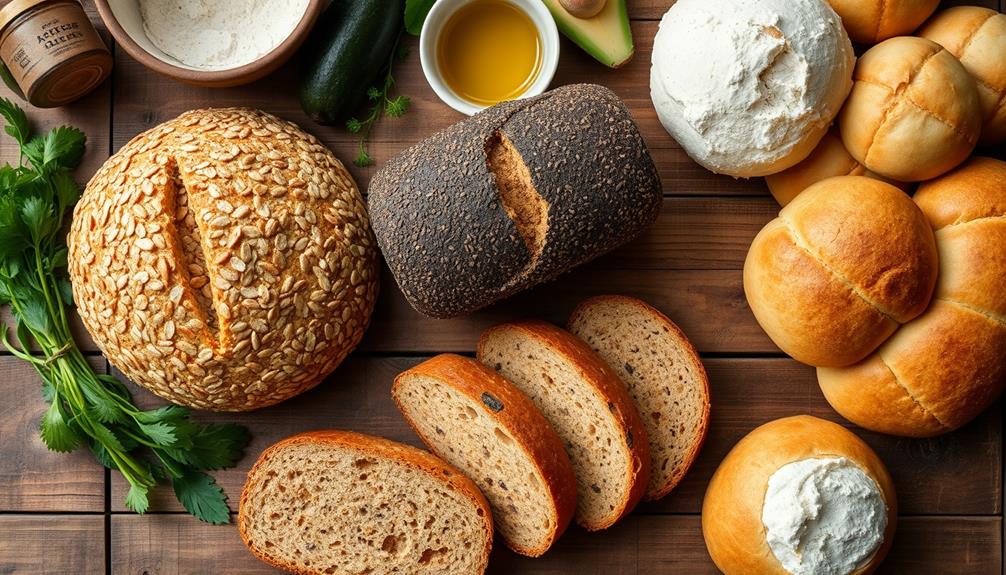
Incorporating keto bread into your meals can be a delicious way to stay on track with your dietary goals. When choosing keto bread, look for options that are low in carbohydrates, ideally with 5 grams or fewer net carbs per slice. This helps maintain ketosis while enjoying your favorite flavors.
You can enhance the nutritional value of keto bread by adding high-protein and high-fat toppings like avocado, cream cheese, or nut butter. These toppings not only boost satiety but also keep your meals satisfying.
Don't hesitate to experiment with various types of keto bread, such as cloud bread or almond flour-based options, to find what you enjoy most. Use keto bread as a base for traditional dishes, such as sandwiches or pizza crust, allowing you to indulge in familiar meals without breaking your low-carb guidelines.
If you make homemade keto bread or buy it from the store, remember to prioritize proper storage. Keep it in airtight containers in the refrigerator or freezer to prolong freshness and prevent spoilage.
With these tips, you'll seamlessly incorporate keto bread into your diet and relish every bite!
Frequently Asked Questions
What Bread Can You Eat on a Keto Diet?
You can eat breads made from almond flour, coconut flour, or psyllium husk. Look for options with low net carbs, like certain brands that offer high fiber and protein while still tasting great and satisfying your cravings.
Which Type of Bread Is Lowest in Carbs?
When it comes to low-carb bread, think of it as a treasure hunt. You'll find options like SOLA and ThinSlim Foods, with net carbs ranging from 0 to 2 grams, perfect for your keto journey.
What Is a Healthy Keto Bread?
A healthy keto bread's low in net carbs, ideally under 5 grams per slice. Look for options made from almond or coconut flour, free from added sugars, with a short ingredient list for better nutrition.
Can I Eat Sourdough Bread on Keto?
You might find sourdough bread a tempting indulgence, but it's essential to examine its carb content. If you choose wisely, you can enjoy it in moderation while staying within your keto goals. Just check those labels!
Conclusion
In the world of keto, finding the right bread can feel like searching for a needle in a haystack. But with the right options, you can enjoy your favorite sandwiches and toast without derailing your diet. Whether you opt for store-bought brands or whip up your own low-carb loaf, incorporating keto bread into your meals is a delicious way to stay on track. So go ahead, savor the crunch, and let your taste buds celebrate your keto journey!
